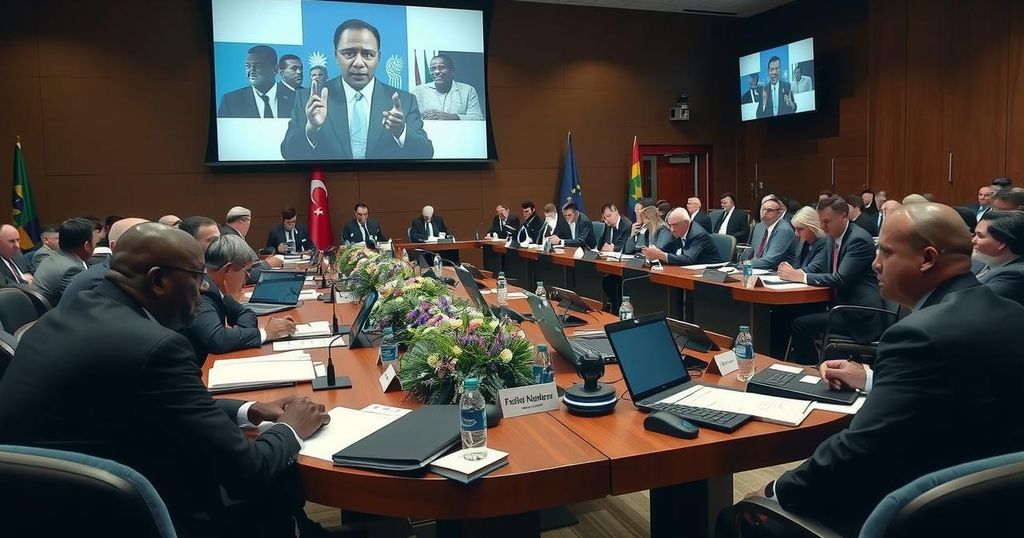Climate change
” ANDERSON, ACTIONAID INTERNATIONAL, AP, ASIA, AZERBAIJAN, BAKU, BOSTON GLOBE, BRAZIL, CLIMATE CHANGE, CLIMATE JUSTICE, ENVIRONMENTAL POLICY, GLOBE, MILTON, NORTH AMERICA, PARIS AGREEMENT, RACHEL CLEETUS, SOUTH AMERICA, SUSTAINABLE DEVELOPMENT, TERESA ANDERSON, UN, UNITED NATIONS, UNITED STATES
Isaac Bennett
0 Comments
Negotiators Urged to Make Progress at UN Climate Summit in Baku
Negotiators at the UN climate summit in Baku are urged to focus on securing financial support for developing countries to combat climate change. UN executive Simon Stiell emphasized the need for substantial agreements beyond mere posturing. However, divergences regarding the required funding persist, compounded by debates about contributions from wealthier nations and certain developing countries. Concurrently, significant climate discussions are taking place at the G20 summit in Brazil.
At the ongoing United Nations climate summit in Baku, Azerbaijan, negotiators are being urged to progress towards a substantial agreement aimed at increasing financial assistance for developing nations to facilitate their transition to clean energy and enhance resilience against extreme weather conditions. UN Climate Change executive secretary, Simon Stiell, highlighted the necessity for countries to move beyond theatrical posturing, urging them to engage in meaningful negotiations to achieve common goals. The summit has drawn climate and environment ministers worldwide, further invigorating the dialogue surrounding climate finance. The major objective of the discussions in Baku centers on securing adequate funding to support developing nations in their efforts to mitigate fossil fuel dependence, adapt to climate change, and address damages from extreme weather events. However, significant disparities persist among nations regarding the financial requirements, with estimates of the needed funds reaching approximately $1 trillion. Several affluent countries are advocating that certain developing nations capable of contributing, including China and Gulf states, should also partake in funding initiatives. Concerns were raised by Teresa Anderson, Global Lead on Climate Justice at ActionAid International, regarding the motivations of wealthier nations in suggesting that developing nations should be included in discussions about funding. She cautioned that such proposals might be tactics to justify reduced financial contributions from richer countries rather than genuine efforts to combat climate change. In the context of escalating climate-related disasters, Rachel Cleetus from the Union of Concerned Scientists expressed that the projected $1 trillion in global climate funds would be deemed a minimal expenditure in the future. This observation underscores the urgency of addressing extreme weather events that have led to significant economic impacts, such as flooding in Spain and hurricanes in the United States. Concurrently, global leaders convene at the G20 summit in Brazil, where climate change, alongside other pressing issues, will be discussed. Harjeet Singh, director of global engagement for the Fossil Fuel Non-Proliferation Treaty Initiative, emphasized that G20 nations must confront their historical emissions and the associated responsibilities, demanding commitment to substantial public finance. Moreover, the Organization for Economic Cooperation and Development (OECD) has been deliberating on reducing public financing for foreign fossil fuel initiatives, which could prevent substantial carbon-emitting projects worth up to $40 billion. This sentiment is echoed by activists at COP29, highlighting the reluctance of specific nations to finalize agreements established in Paris. Lauri van der Burg of Oil Change International stressed the importance of President Biden’s support for impactful climate financing initiatives to secure a beneficial legacy and encourage total commitment among all involved nations.
The ongoing climate summit in Baku is part of a broader international effort to address climate change and its repercussions, particularly focusing on the financial needs of developing countries. The discussions here reflect a growing consensus on the importance of providing adequate funding for climate initiatives and the challenges posed by differing financial contributions among nations. These talks occur alongside significant meetings of global leaders, such as the G20, emphasizing the nexus of global economic policy and climate action.
In conclusion, the ongoing discussions at the UN climate summit in Baku underscore the urgent need for robust financial commitments to aid developing countries in their climate transition and adaptation efforts. The call for action from various leaders highlights a crucial juncture in climate negotiations, as nations strive to address historic inequities and the financial implications of climate change. Engaging in substantive negotiations rather than performing theatrical gestures is essential for achieving meaningful progress in combatting climate crises.
Original Source: www.bostonglobe.com




Post Comment